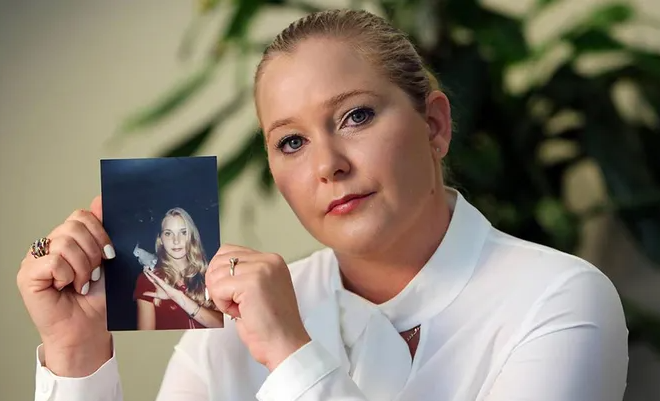Virginia Giuffre, the woman who courageously stood at the center of one of the world’s most high-profile sex trafficking cases involving Jeffrey Epstein and Prince Andrew, has died by suicide at the age of 41, according to reports.

Giuffre passed away at her home in Neergabby, Western Australia, where she had been residing in recent years. Her death marks a deeply tragic chapter in a case that has exposed a global web of exploitation, privilege, and power.
Her family released a heart-wrenching statement to NBC News, saying, “It is with utterly broken hearts that we announce that Virginia passed away last night at her farm in Western Australia. She lost her life to suicide, after being a lifelong victim of sexual abuse and sex trafficking.”
Virginia’s life had become emblematic of resilience and justice in the face of trauma. She was just a teenager when she became entangled in the web of Epstein’s sex trafficking ring. Recruited at the age of 16 while working at Mar-a-Lago, she was lured into Epstein’s orbit, where she said she endured years of abuse at the hands of powerful men.
Among those she accused was Prince Andrew, Duke of York, the second son of Queen Elizabeth II. In a 2021 lawsuit filed in New York, Giuffre alleged that she was forced to have sex with the British royal on three separate occasions between 1999 and 2002 while she was underage. The lawsuit sent shockwaves around the world, further cementing her as a key voice in the fight to hold Epstein’s enablers accountable.
Although Prince Andrew has consistently denied the allegations, the lawsuit was settled out of court in early 2022, with Giuffre receiving a reported multimillion-dollar payout. Importantly, the settlement did not include any admission of guilt. For Giuffre, however, the case was never just about money — it was about justice, accountability, and giving a voice to those who had long been silenced.
Jeffrey Epstein died by suicide in a federal jail in New York City in August 2019 while awaiting trial on federal sex trafficking charges. His death left many questions unanswered and cast doubt over whether justice would ever be fully served. For survivors like Giuffre, Epstein’s death was a bitter blow, depriving them of the chance to see him stand trial.
In the years following Epstein’s death, Giuffre remained vocal about her experiences, using her platform to advocate for fellow survivors of abuse and trafficking. She founded the nonprofit organization Victims Refuse Silence, which aimed to support those who had experienced sexual exploitation and to push for systemic reforms to combat trafficking.
Despite the horrors she endured, Virginia was known for her strength and compassion. Friends and supporters often described her as deeply committed to protecting others from the pain she had lived through. But beneath her activism lay profound wounds that never fully healed.
Her death has reignited conversations about the toll of sexual trauma and the burden often carried by survivors, especially those thrust into the public eye. Experts and advocates have long warned of the psychological impact that public litigation and media scrutiny can have on survivors of sexual violence — impacts that are rarely visible but often devastating.
Social media has since been flooded with tributes, memories, and calls for greater action to support victims of abuse. “Virginia Giuffre was a hero,” tweeted one advocate. “She told her truth when it was dangerous and fought for others even when she was still healing herself. The world failed her.”
Giuffre leaves behind a husband and three children. Her legacy, however, stretches far beyond her family. She became a symbol of courage, a voice for the voiceless, and a relentless fighter in the battle against sex trafficking.
Her death is a solemn reminder that justice, while necessary, does not always heal — and that those who speak out need more than our admiration; they need our care, our support, and our protection.
If you or someone you know is struggling, support is available. In Australia, contact Lifeline at 13 11 14. In the U.S., you can call the National Suicide Prevention Lifeline at 1-800-273-TALK (8255) or text 988.